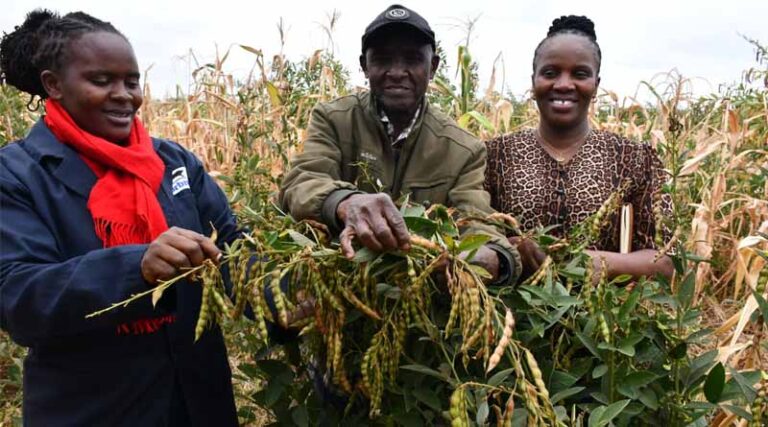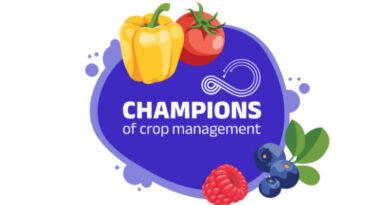
Kenyan Farmer Unlocks New Opportunities Through breakthrough Improved Pigeonpea Variety
09 October 2025, Kenya: When CIMMYT and KALRO, through the AVISA project, introduced the Mituki pigeonpea variety to a farmer group in Makueni in October 2023, it was met with a mix of curiosity and resistance. Many farmers in the group were skeptical, uncertain about trying out a new variety they had never grown before. For years, they had relied on familiar traditional varieties that are low-yielding, late-maturing, have smaller pods and grain size, and are difficult to shell due to deep pod constrictions. It was what they were used to, and without exposure to alternatives, many saw little reason to change.
During a recent field visit, we met with Mr. Francis Ndiso, a member of the Makueni Agribusiness Ventures group. For him, the introduction of the Mituki variety felt like an opportunity worth taking. Guided by advice from the pigeonpea breeding program at KALRO and equipped with practical knowledge gained from AVISA-supported training sessions, Francis decided to take a leap of faith. He planted 40 kilograms of Mituki seed on his 10-acre plot.
“I knew it was a risk as many farmers grow trial varieties on small plots,” he said. “But sometimes, if you want to grow, you have to try something different and be bold. I attended the trainings to obtain agronomic advice to grow the variety and realized this variety had potential. Others in my group were not convinced; they preferred to stick with what they knew. But I told myself, if I do not try it now, I may never know what I am missing.”
Francis did not just embrace a new variety; he embraced a new mindset. By adopting improved practices and a market-oriented approach, he positioned himself as a pioneer within his community. “Looking back, I am very happy with the choice I made because of the results. My neighbors who were hesitant at first are now coming to me for seed and to learn how they can get started too.”
He has even taken on a mentorship role with younger farmers, including a young woman agrodealer who received seed from him and is now growing Mituki on her farm for the first time. As both an agrodealer and a member of the Makueni Agribusiness Ventures group, she is eager to stock certified seeds in her outlet, having seen the variety’s strong performance firsthand. She has also expressed interest in turning her own farm into a demonstration site to showcase improved technologies and stimulate demand for inputs at her shop.
High yields, high demand and new markets
The results were both swift and impressive. In the first season, he intercropped the Mituki pigeonpea variety with cowpeas and maize, diligently applying the practices he learned, especially around pest management and soil health. Francis quickly began to see the difference the variety could make.
His first harvest came in November 2023, and for the two months that followed, he capitalized on vegetable pigeonpea, obtaining an average of nine 60-kilogram bags of green pigeonpea per day, five days a week. When it came time for the dry grain harvest, he produced 38 bags of 100 kilograms each, a remarkable output from his 10-acre plot.
As his reputation grew, Francis’ success earned him invitations to numerous agricultural forums, where he championed the benefits of Mituki. His visible results have transformed him into a change agent within his community, inspiring widespread interest and generating seed requests from as far as Kilifi County in the coastal region. His efforts have created not only local demand but also momentum for scaling the variety to new areas.
The market response was equally encouraging. In August 2024, Francis sold one metric ton of dry grain to an institutional buyer at KES 200 per kilogram for repackaging and distribution. The remainder of his produce was sold to local farmers who had witnessed the variety’s performance and were eager to adopt it themselves.
“Once the harvest started coming in, people could not believe what they were seeing,” Francis shared. “I was getting calls from other farmers asking, ‘What variety is that?’ or ‘Where can I get the seed?’ I had never experienced demand like that before. This variety has really changed things for me.”
Beyond financial gain, Francis noted how his success is sparking curiosity and shifting perceptions within the community. “People who were doubtful at first are now visiting my farm to learn more. It feels good to be part of something that is helping not just me, but others too.”
Seeding a movement: from farmer to seed supplier
As a member of Makueni Agribusiness Ventures, a registered seed enterprise, Francis’ success has not gone unnoticed. His achievements with the Mituki variety quickly caught the attention of the AVISA project team and its seed system partners. Recognizing the momentum building around this improved pigeonpea, AVISA has encouraged the group to pursue official licensing to become certified seed suppliers within Makueni County, an important step toward strengthening local seed systems and ensuring access to quality seed for more farmers.
In the spirit of shared progress, Francis has already distributed 4,000 kilograms of seed to fellow group members who are now eager to replicate his success. Local farmers who once hesitated to try a new variety are now frequent visitors to his farm, curious, inspired, and ready to make the switch.
“This variety has full pods, bold grains, and tastes great when cooked,” Francis said with pride. “It stands out in the field due to high pod load, and people are noticing. They come to ask, ‘What is this seed? Where can I get it?’ That tells you something is working.”
Rael Karimi, a legumes breeder at the Kenya Agricultural and Livestock Research Organization (KALRO), emphasized why certified seed is vital to sustaining this kind of impact. “Using certified seed ensures genetic purity and consistent performance. When farmers plant certified seed, they get an assurance of quality and productivity. In areas like Makueni, where climate variability is a concern, improved varieties like Mituki can make a real difference in productivity and livelihoods.”
helping to transform pigeonpea production across the region.
Tackling challenges head on
Despite the promise of Mituki, growing it is not without challenges. According to Francis, the variety requires weekly spraying during the flowering period. The variety also has a short window between green and dry stages, which means harvesting for a large area of land, like he has done, must happen quickly and intensively, demanding significant labor during harvest and market coordination.
Additionally, market uncertainties due to external factors, such as imports from Tanzania during the off seasons, often depress local prices and hinder effective market timing by farmers.
Lilian Gichuru, CIMMYT’s Seed Systems Specialist in the Dryland Crops Program, had this to say during the field visit: “Our breeding focus is on varieties that not only deliver high yields but also have traits that reduce production costs such as pest and disease tolerance and longer harvest windows. If farmers can spray less and manage labor more efficiently, they can maximize profits even when markets are volatile. We want to ensure every variety we release works both in the field and in the marketplace.”
A livelihood reimagined
Yet, the returns remain tangible. On peak harvest days, Francis earned a gross income of between KES 28,000 and 30,000. This income has enabled him to pay for postgraduate studies for his children, support his household, and invest in the next farming cycle. He encourages his children to take up farming, noting that “the benefits are real and immediate.” What is more, his farm outputs have circular value. The pigeonpea husks are used to make animal feed, adding to the sustainability of the venture.
Sustaining the momentum
With advice from extension agents, Francis is learning good farming practices to restore soil health and preserve yields. This, along with a consistent supply of certified seed, is key to maintaining the high standards he has achieved. His story is a testament to what happens when smallholder farmers are empowered with the right varieties, high-quality seed, knowledge, and support. As Mituki gains ground in Makueni and beyond, this farmer and his group are not just growing crops, they are growing livelihoods, resilience, and a new future for pigeonpea in Kenya.
📢 If You’re in Agriculture, Make Sure the Right People Hear Your Story.
From product launches to strategic announcements, Global Agriculture offers unmatched visibility across international agri-business markets. Connect with us at pr@global-agriculture.com to explore editorial and advertising opportunities that reach the right audience, worldwide.






